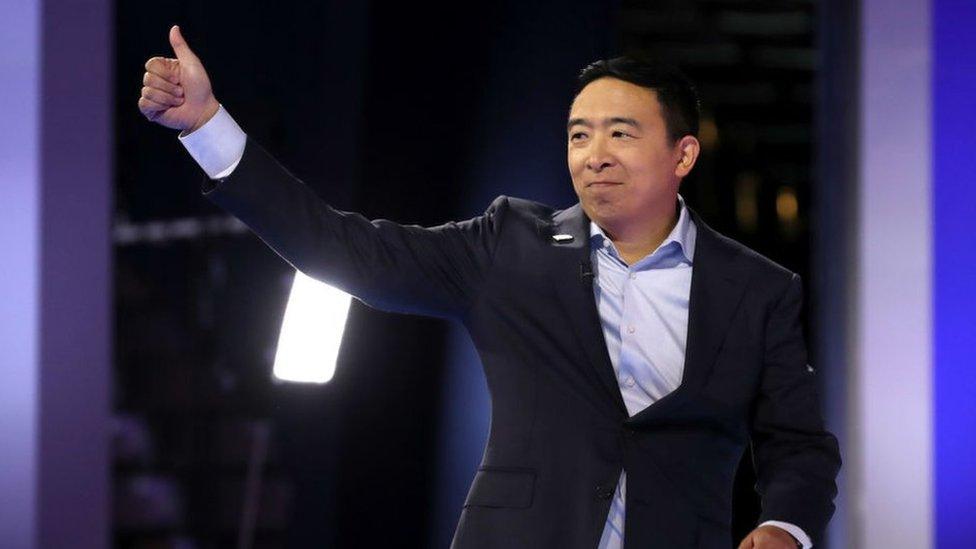China and US wage duelling 'hearts and minds' campaigns
- Published
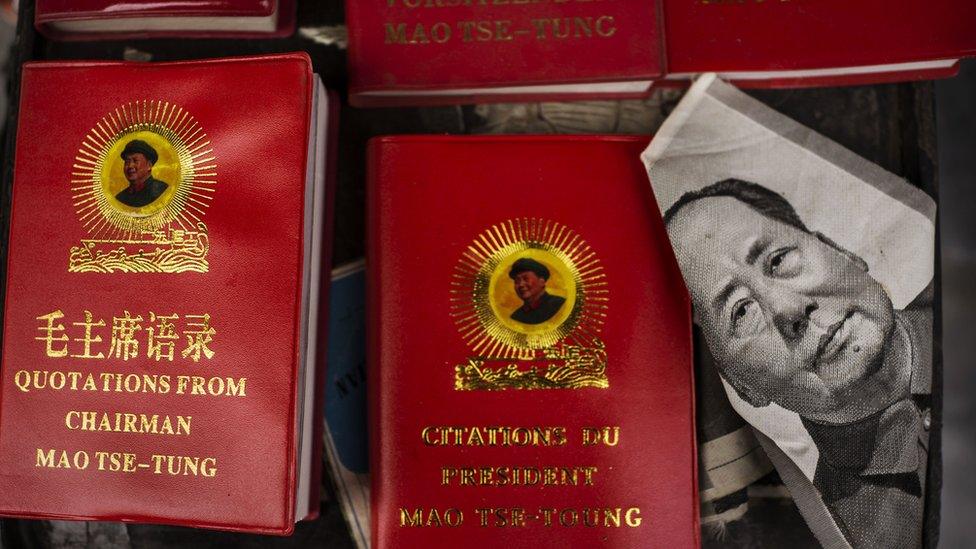
Chinese leaders say that they are still inspired by the teachings of Chairman Mao Zedong
As the battle between the US and China over tariffs goes on, an age-old ideological feud is being waged, pitting Beijing's Communist Party against Washington-style democracy. It's not a fight for trade or for territory, it's for hearts and minds.
The term "influence operations" describes the way that government officials try to find out information about another country and also the way they attempt to sway the views of people who live there, according to researchers at the nonpartisan Rand Corporation, external.
The subject received a great deal of attention earlier this year when Robert Mueller, a former US special counsel, compiled evidence about the way Russians allegedly tried to influence the US presidential election, partly through the social media feeds of millions of Americans.
Yet information about the way that Chinese officials try to influence people's views is less well known. Here are five areas where Americans and Chinese are promoting their own political and cultural ideas - and are facing pushback from the other side.
Use Twitter to influence people's views
Chinese Ambassador Cui Tiankai said recently on Twitter that people should support the "One China" policy, which means Taiwan is part of China. He posted a stern warning against those who undermine the party's position: "Those who play with fire will only get themselves burned."
People in Washington object to the way that Mr Cui and other Chinese officials use social media, saying that their posts serve as veiled threats to Chinese Americans who live here in the US and do not support the Chinese government's position.
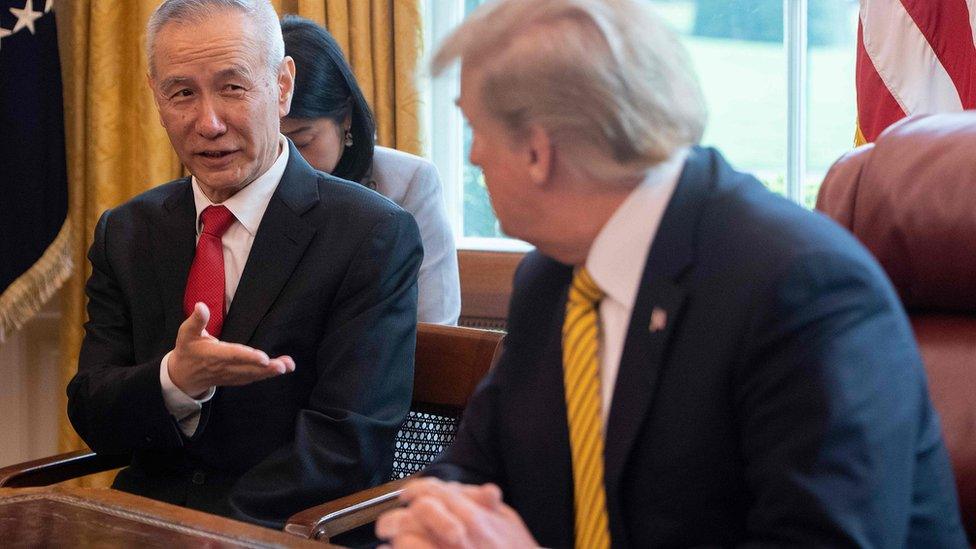
Vice Premier Liu He and President Trump, shown in April, have discussed trade issues
Other times, according to US officials, the Chinese use disinformation. Twitter and Facebook executives have taken down hundreds of Chinese-run accounts that were, according to the executives, part of "a coordinated state-backed operation" to promote Beijing's view of Hong Kong.
The events in Hong Kong have been a particular flashpoint on social media.
Chinese officials criticise people in the US who tweet in support of the Hong Kong protestors - and have at times accused US officials of provoking violence and acting in a hypocritical manner.
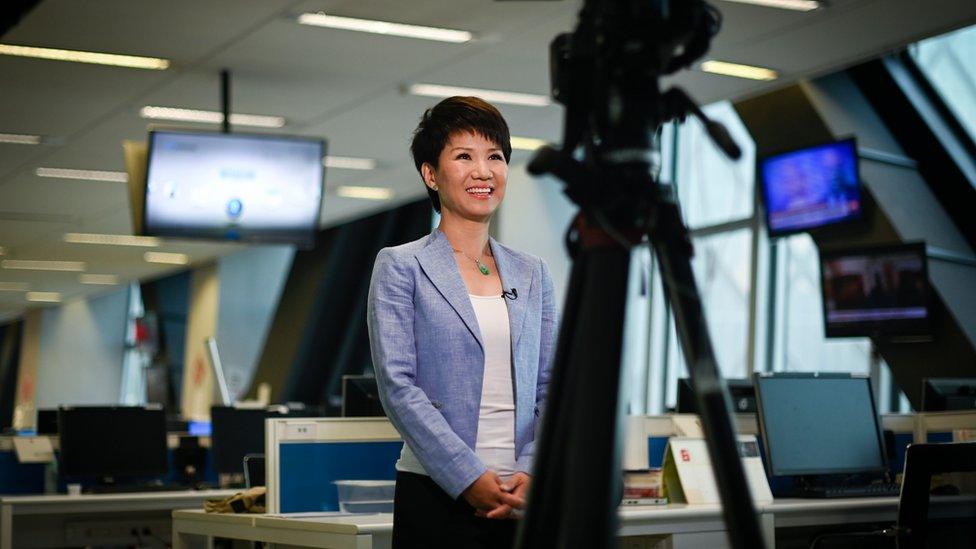
Beijing broadcasts its views through China Global Television (anchor Liu Xin is shown)
As a rapper in a video , externalon the state-run China Global Television Network said: "Hey Democracy / Yeah I'm talking about American hypocrisy".
A debate about the relationship between corporate America and China came under scrutiny this week after the manager of US basketball team backed Hong Kong protesters in a tweet and got an angry response.
China's state broadcaster, CCTV, said they would suspend broadcasts of the NBA's preseason games.
Allow X content?
This article contains content provided by X. We ask for your permission before anything is loaded, as they may be using cookies and other technologies. You may want to read X’s cookie policy, external and privacy policy, external before accepting. To view this content choose ‘accept and continue’.

Shape opinion through radio broadcasts
China Radio International programmes are broadcast on radio stations such as WCRW 1190 , externalin Leesburg, Virginia. Sarah Cook, an analyst at Freedom House, a pro-democracy nonprofit organisation in the US, says that the Chinese officials use these programmes as a way to soften criticism of their government.
Sarah Cook, an analyst at Freedom House, a pro-democracy nonprofit organisation in the US, says that the Chinese officials use these programmes as a way to soften criticism of their government. The Chinese government has come under attack for its record on human rights, she explains, and the Beijing officials try to counter the criticism by emphasising their contributions to science and other realms.
These and other achievements of the Chinese government are promoted in sunny, upbeat radio despatches. "They want to show a positive view of China," Cook says, describing their radio broadcasts.
"They want people to think about pandas and high-speed trains."
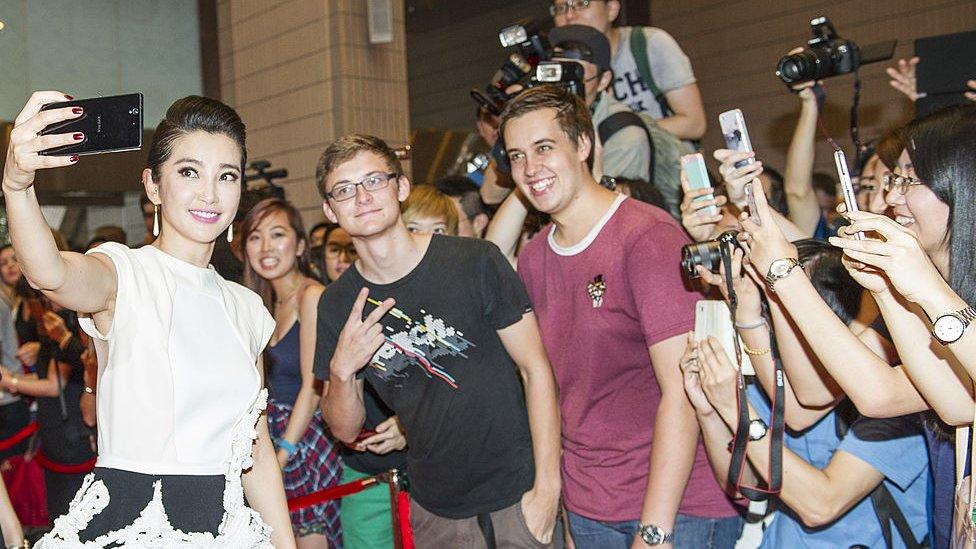
Chinese studios helped finance a Transformers film (Li Bingbing, one of their stars, shown above)
In turn, US officials broadcast their views on policy issues through Mandarin and Cantonese programmes on Voice of America and Radio Free Asia. These radio outlets are funded by the US government. Beijing officials sometimes jam them, as journalists who cover the entertainment industry, external have reported. The Beijing officials accuse the Americans of airing propaganda to influence the views of people who live in China.
Influence people through newspaper articles
Kenneth Geers, a senior fellow at the Atlantic Council, a US think-tank, says Chinese officials attempt to "drive discussion" through English-language editions of state-run China Daily and Global Times. Articles may raise questions about US troops stationed in Japan and in this way, he says. "China can insert itself and affect what people are hearing."
If support for the stationing of US troops in Japan were to erode, explains Mr Geers, US military presence in Asia might diminish: "China could conceivably win battles by changing how we perceive Japan or the South China Sea."

US officials say Beijing tries to sway people's views of South China Sea
Chinese officials say they are not trying to influence views in the US through news outlets or other platforms, citing their policy of noninterventionism, Five Principles of Peaceful Coexistence. This doctrine emphasises "mutual respect for sovereignty" between them and other countries.
Showcase national culture through film
Beijing officials believe that Hollywood films misrepresent the Chinese, and so sometimes they change the way the Chinese are portrayed.
"Beijing's censors" edited Red Dawn, said US Vice-President Mike Pence during a speech in 2018, external, describing how the film was altered to make "the villains North Korean - not Chinese".

Chinese officials said Americans incited unrest in Hong Kong
For people in China, the changes made to Hollywood movies are a legitimate way to fight US bias.
The US films, regardless of how they are edited, have an impact. Robert Daly, the director of the Wilson Center's Kissinger Institute on China and the US, says that through films, books and culture, the US has a presence in China. He believes US culture has influenced the way that people in China think and how they see the world.
Who really pays in a tariff war?
In comparison, he says, the impact of Chinese culture on the US has been negligible. "It's not even a fleabite," he says, compared to "how China has been influenced by America".
Promote values through non-governmental organisations
Pro-democracy organisations are funded through the US national endowment for democracy and operate openly in China. Americans view these activities as "utterly benign", according to Dartmouth College's William Wohlforth, external.
Beijing officials disagree.
Writers for China Daily, external accuse the US-based funders of these organisations of "using the tool of democracy" for nefarious goals.
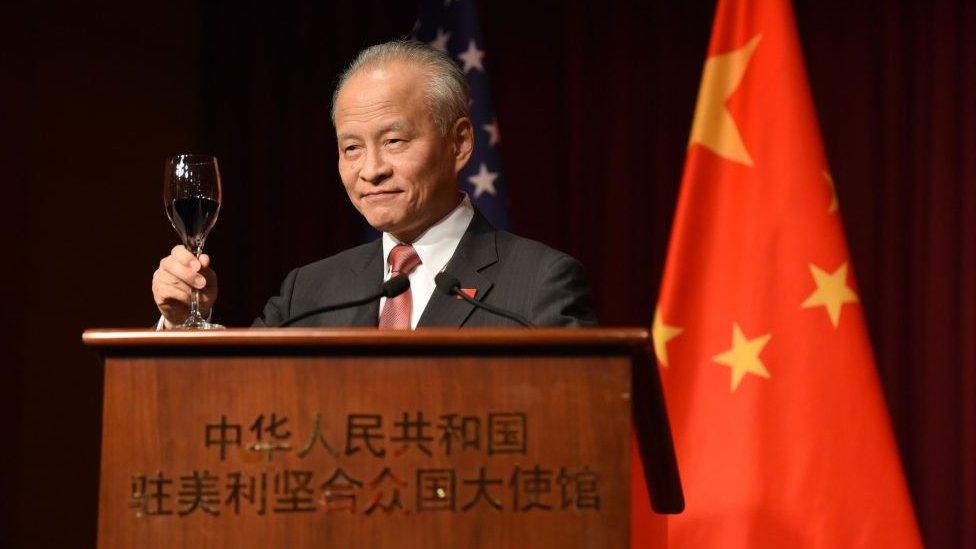
Chinese ambassador Cui Tiankai is active on Twitter
"China views US democracy promotion as a strategic threat," wrote Baogang He in Wilson Quarterly, external, and believe that the US officials are trying to isolate China "from Europe and elsewhere internationally - in part by consolidating US moral leadership".
And so the debate over words and ideas continues.
Find out more about the US-China row in a World Service Radio documentary The Spy of Raspberry Falls.
- Published27 September 2019
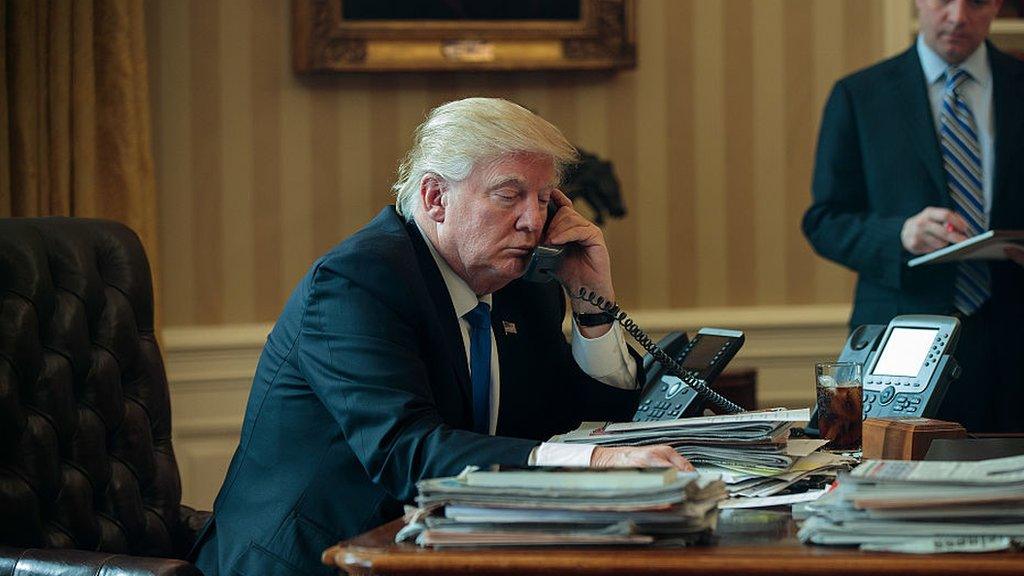
- Published16 January 2020
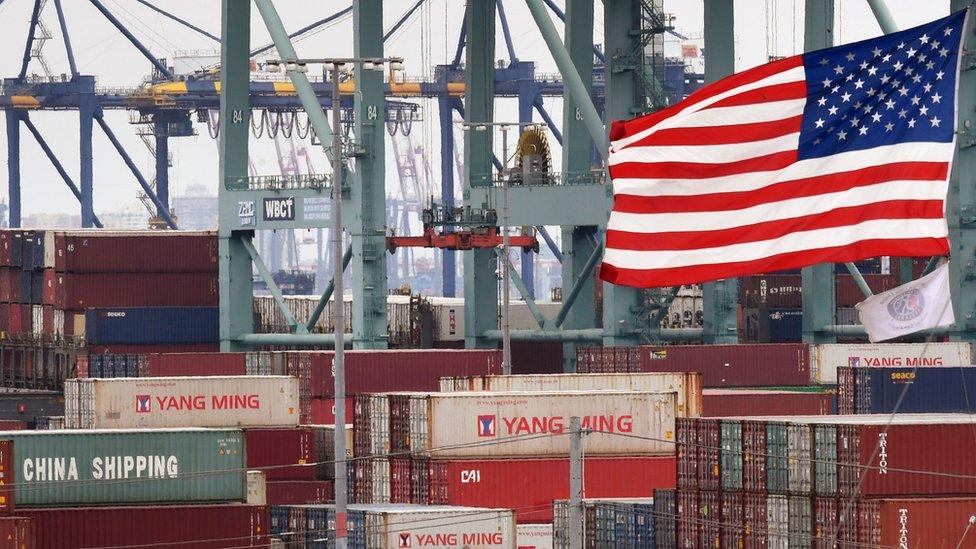
- Published23 June 2019

- Published8 October 2019

- Published29 September 2019
